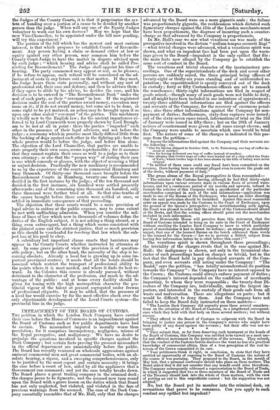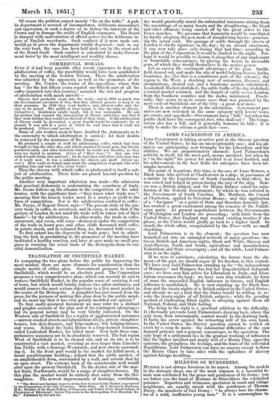IMPEACHMENT OF THE BOARD OF CUSTOMS.
Tun petition in which the London Dock Company have carried their case before the House of Commons is an impeachment against the Board of Customs such as few public departments have had to sustain. The misconduct imputed is morally worse than peculation ; for it comprises incompetency, negligence, misuse of the Royal prerogative, and malignancy. We have no desire to prejudge the questions involved in specific charges against the Dock Company ; but certain facts proving the grossest misconduct in the official department are unmistakeably before the public. The Board has recently ventured on wholesale aggressions against eminent commercial men and great commercial bodies, with an ab- solute bearing, a rigour, and a sweeping comprehensiveness, only to be justified by the most cogent and certain necessity; it brings the case before a court of law, aided by all the appliances that a Government can command ; and yet the case totally breaks down. The Board places a great trading company in the criminal dock; the charges prove to be figments ; and the accused now turn round upon the Board with a grave lesson on the duties which that Board has not only neglected, but violated, and violated in the face of previous warnings from the accused. The case of the Dock Com- pany essentially resembles that of Mr. Hall, only that the charges advanced by the Board were on a more gigantic scale : the failure was proportionately gigantic, the recklessness which dictated such figmentary charges against the gite of the London merchants must have been proportionate, the disgrace of incurring such a counter- charge as that advanced by the Company is proportionate. In Mr. Hall's case we saw what vexatious use was made of the prerogative involved in the dictum " nullum tempus oecurrit Regi" —what trivial charges were advanced, what a vexatious spirit was shown, and what an impudent face had been put upon the warn- ings given to the Board—impudent is the only epithet that fits : the main facts now alleged by the Company go to establish the same sort of conduct in the Board.
The vexatious and trivial character of the incriminatory pro- ceedings. One of the superintendents of the dock and seven other persons are suddenly seized, the three principal being officers of twenty-eight or thirty-six years standing and of unblemished re- putation ; the superintendent is openly conveyed out of the dock in custody; forty or fifty Customhouse-officers are set to ransack the warehouses ; thirty-eight informations are filed in respect of goods seized,—though many of such goods were not liable to duty, and all might have been included in one indenture of appraisement; twenty-three additional informations are filed against the officers and servants of the Company, for the recovery of enormous penal- ties ; also three other informations against the Company for non- payment of duties ; furthermore, sixty-four capiases were issued; out of the sixty-seven cases raised, informations of trial on the 22d of January were issued in fifty-three ; but on the 29th of January notices of countermand were given in all cases except eleven; and the Company were unable to ascertain which case would be tried first. The nature of some of the charges is indicated in this pas- sage from the petition-
' Among the informations filed against the Company and their servants are the following : viz.
One for having shipped in October 1849, to St. Petersburg, one bag of coffee in- stead of another.
" One for having delivered one bag of coffee instead of another.
"One alleging that twelve bags of coffee were landed out of a ship called the Duke of York; which twelve bags it has been shown by the bills of lading were never shipped. "In neither of these cases could any fraud have been committed on the revenue, there having been no attempt alleged even to remove the goods out of the docks, without payment of duty."
The gross abuse of the Royal prerogative is thus recounted-
" The solicitor of the Customs having, although he had filed thirty-eight informations upon various seizures made in various floors of several ware- houses, and for a continuous period of six months and upwards, refused to furnish the solicitor of this Company with a specification of the particular merchandise comprised in such of the said informations—application was made to one of the Barons of the Exchequer, who issued an order directing that the said particulars should be furnished. Against this most reasonable order an appeal was made by the Customs to the Court of Exchequer, upon the ground of the Queen's prerogative ; but notwithstanding such' appeal, the Court was pleased to order that the solicitor of the eustomsshould attend at the Docks, and that the seizing officer should point out the merchandise included in each information.
"Your Honourable House will perceive from this statement, that the Board of Customs intended to bring on its suits in the Court of Exchequer without enabling the London Dock Company to know to which particular parcel of merchandise it had to direct its defence ; an attempt so manifestly unjust, that one of the learned Barons on the bench addressed these words to the counsel for the Crown—' Are we to prevent a British subject from having fair information before he is cited before this court ?' " The vexations spirit is shown throughout these proceedings; the triviality of the charges rivals that in the case against Mr. Hall; the malignancy is shown, not only in the tyrannical cha- racter of such proceedings based on charges so trivial, but in 'the fact that the Board held in pay discharged servants of the Com- pany, and even servants still acting under the Company ! " The Board," says the petition, " has totally...misunderstood its position towards the Company" : the Company have no interest opposed to the Crown ; the Customs could always enforce payment of duties ; the Company's interest depended on the confidence of merchants importing, to whom they were responsible ; the twenty-four Di- rectors of the Company are, individually, among the largest im- porters, and interested in the custody of their goods safe from all waste and malversation. These are allegations ex parte ; but it would be difficult to deny them. And the Company have not failed to keep the Board duly instructed on these matters- " The London Dock Company did urgently press these several considera- tions on the attention of the Board of Customs, in a lengthened correspond- ence which they held with that body on these several matters ; but without success.
" They offered to the Board of Customs to cooperate with the Board in bringing to justice any person in the Company's service who might have been guilty of any fraud against the revenue ; but their offer was not ac- cepted. • • • • " They submit that, so far from deserving such treatment at the hands of the Board of Customs, this Company was entitled to be viewed as a most use- ful and efficient instrument in the protection of the revenue. They submit, that the conduct of the Customs herein discloses the want no less of a practical knowledge of commercial affairs, than of a true perception of the real in- terests of the Crown committed to its care.
"Your petitioners think it right, in conclusion, to state that they have omitted no opportunity of exposing to the Board of Customs the nature of the course it was pursuing. They proposed to the Board, in the month of May last, that a personal conference should take place on these matters. The Board stated that it did not consider that any benefit could arise therefrom. The Company subsequently addressed a representation to the Board of Trade, in which it suggested that two or three members of the Board of Trade and of the Treasury should look into the whole of these matters, with the view of putting an end to this unprofitable contest : but the suggestion was not adopted." No, but the Board put its monitor into the criminal dock, on accusations that prove to be romances. Can you apply to suoll conduct any epithet but impudent?
Of course the petition cannot merely "lie on the table." A pub- lic department is accused of incompetency, deliberate misconduct, and oppression, in such a degree as to betray the interests of the Crown and to damage the credit of English commerce. The Board is charged with malversation of official power for the deliberate in- jury of English merchants. Such conduct, if it were made out, would go to prove the department totally depraved ; and, to say the very least, the case has been half made out by the overt acts of the Board itself. Such conduct is calculated to make Govern- ment hated by the most intelligent and wealthy classes.



























 Previous page
Previous page